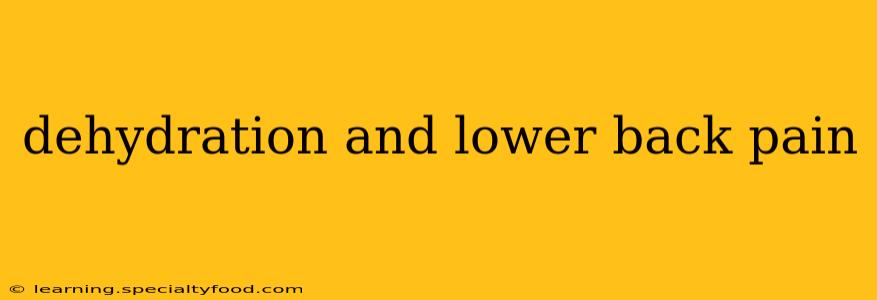Dehydration, the state of lacking sufficient water in the body, might seem unrelated to lower back pain, but the connection is stronger than you might think. While dehydration isn't the sole cause of lower back pain, it can significantly exacerbate existing conditions and even trigger pain in susceptible individuals. This comprehensive guide explores the relationship between dehydration and lower back pain, addressing common questions and providing helpful information.
How Does Dehydration Cause Lower Back Pain?
Our bodies are approximately 60% water, and this water plays a crucial role in various bodily functions, including cushioning our joints and spinal discs. When dehydrated, the intervertebral discs in your spine, which act as shock absorbers, lose their hydration. This reduction in hydration leads to decreased disc height and flexibility, making them more susceptible to injury and pressure. The resulting stiffness and reduced shock absorption can directly contribute to lower back pain.
Furthermore, dehydration can lead to muscle cramps and spasms, particularly in the back muscles. These spasms can cause intense pain and further restrict movement, intensifying the discomfort. The loss of electrolytes, which are essential for muscle function, also plays a significant role in these cramps.
Can Dehydration Worsen Existing Back Problems?
Absolutely. If you already suffer from lower back pain due to conditions like osteoarthritis, sciatica, or a herniated disc, dehydration can significantly worsen your symptoms. The reduced cushioning and increased muscle tension caused by dehydration put added stress on already compromised areas of your spine, leading to more severe and persistent pain.
What are the Symptoms of Dehydration?
Recognizing dehydration is crucial in managing lower back pain. While thirst is the most common symptom, other signs include:
- Dark yellow urine: This indicates concentrated urine, a sign of insufficient fluid intake.
- Headache: Dehydration can trigger headaches, often accompanied by dizziness and lightheadedness.
- Fatigue and muscle weakness: The body struggles to function efficiently without adequate hydration.
- Dry mouth and skin: These are obvious signs of dehydration.
- Constipation: Dehydration can make bowel movements difficult.
How Much Water Should I Drink Daily to Prevent Back Pain?
There's no one-size-fits-all answer, as individual fluid requirements vary based on factors such as activity level, climate, and overall health. However, a general guideline is to aim for at least eight glasses of water per day. Staying adequately hydrated is vital for overall health and well-being, and it can significantly contribute to reducing the risk of lower back pain exacerbation. Pay attention to your body's signals – if you feel thirsty, drink water!
Are Electrolytes Important for Back Pain Relief?
Yes, electrolytes such as sodium, potassium, and magnesium are crucial for muscle function and reducing muscle cramps. While water is essential, replenishing electrolytes lost through sweating, especially during physical activity, can help prevent dehydration-induced back pain. Consider sports drinks or electrolyte tablets, especially after strenuous exercise.
Can I Treat Lower Back Pain Caused by Dehydration with Water?
If your lower back pain is directly related to dehydration, increasing your water intake can provide some relief. However, if the pain is severe, persistent, or accompanied by other symptoms, it's crucial to consult a healthcare professional. They can properly diagnose the underlying cause of your back pain and recommend appropriate treatment options.
When Should I See a Doctor for Lower Back Pain?
Seek medical attention if your lower back pain:
- Is severe or doesn't improve with rest and hydration.
- Is accompanied by numbness, tingling, or weakness in your legs or feet.
- Is accompanied by fever or unexplained weight loss.
- Is accompanied by bowel or bladder dysfunction.
- Has persisted for more than a few weeks.
Dehydration can be a contributing factor to lower back pain, but it's vital to understand that it's not always the primary cause. Maintaining proper hydration is crucial for overall health and can help alleviate some back pain symptoms, but a comprehensive approach to managing back pain often requires a multifaceted strategy involving lifestyle adjustments, physical therapy, and potentially medical intervention. Remember to always consult a healthcare professional for a proper diagnosis and treatment plan for your lower back pain.
